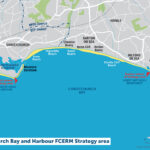
In the 2020 Budget, the government announced a £200 million fund to test and demonstrate a range of innovative projects to help communities become more resilient to flooding and coastal change. The fund will provide a fantastic opportunity to develop and test new and emerging approaches and ambitions set out in the new Government Policy Statement and the National Flood & Coastal Erosion Risk Management Strategy.
Applications for this new Innovative Flood and Coastal Resilience Programme will open in autumn 2020, with successful projects will be announced in spring 2021 and completing before spring 2027. Selected partnership projects will receive up to £6 million over the six years.
What is the Innovative Flood and Coastal Resilience Programme about?
This programme offers a unique opportunity to be at the forefront of helping communities to become more resilient and able to adapt to the impacts of climate change. The programme will:
- Support the households, communities and businesses in 25 areas affected by flooding or coastal change now, and in the future, to adapt to a changing climate by improving their resilience to flooding and/or response to coastal change.
- Work with local partners to trial and evaluate the costs and benefits of different actions and explore how they can work individually and together to improve resilience and adaptation of households, communities and businesses to flooding and/or coastal change.
- Inform the development of future flood and coastal erosion policy and funding programmes (post 2027).
- Encourage strategic thinking, collaborative relationships across sectors and between stakeholders working across administrative boundaries.
Who can apply?
Projects must be led by a single Lead Local Flood Authority (LLFA) or Coast Protection Authority (CPA) but successful projects will represent a consortium of other local partners. We’d therefore like to encourage you (LLFA/CPA), as the lead applicant, to proactively engage with your other local Risk Management Authorities and your Regional Flood and Coastal Committee to co-develop the application and its alignment with the existing programme. We are keen to support partnership applications that have been developed with local communities and stakeholders who are likely to be interested in and/or affected by the proposed work.
How to apply?
The application process will start with a simple and short expression of interest form. Once assessed, the short-listed projects will be invited to a proposal interview. We will provide each of the 25 selected projects with some funding to develop their proposals with more detail during spring 2021, before the projects formally start in summer 2021.
What can you do to get ready?
- Please forward this to your flood and/or coastal erosion team.
- Complete the 4 actions outlined below.
Actions: we would like your flood and/or coastal erosion team to:
1. Email us at InnovativeResilience@environment-agency.gov.uk with the name, job title and email address of at least one colleague leading on flood and coastal risk management from your LLFA/CPA so we can link them up with the local Environment Agency team and keep them up to date about the application process. Even if you decide not to apply, we’re keen to maintain an up-to-date contact list to promote opportunities to share and discuss learning about flood and coastal resilience building throughout the period of this programme.
2. Talk to your local Environment Agency flood and coastal erosion risk management team about this programme.
3. Encourage your lead contact to join one of the following support webinars to find out how to make the most of this opportunity:
- Webinar 1 – Tuesday 22nd September 2020 at 11:00 – 12:15 https://innovative-resilience-prog-webinar1.eventbrite.co.uk
- Webinar 2 – Wednesday 23rd September 2020 at 11:00 – 12:15 https://innovative-resilience-prog-webinar2.eventbrite.co.uk
- Thursday 24th September 2020 at 15:00 – 16:15 https://innovative-resilience-prog-webinar3.eventbrite.co.uk
We have limited space on these webinars so please prioritise who should attend from your project consortium and sign up asap via Eventbrite by using these links.
4. Bring together a partnership of people, organisations and groups to discuss ideas with partners and explore what flooding or coastal issues the project could address, the innovative resilience actions you could deliver and, the wider challenges and opportunities the project could tackle. Be creative and ambitious, and think how you can show a willingness to test out different approaches and draw out learning.






